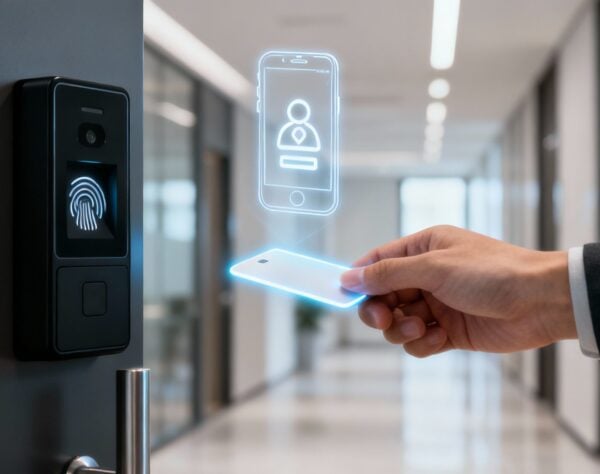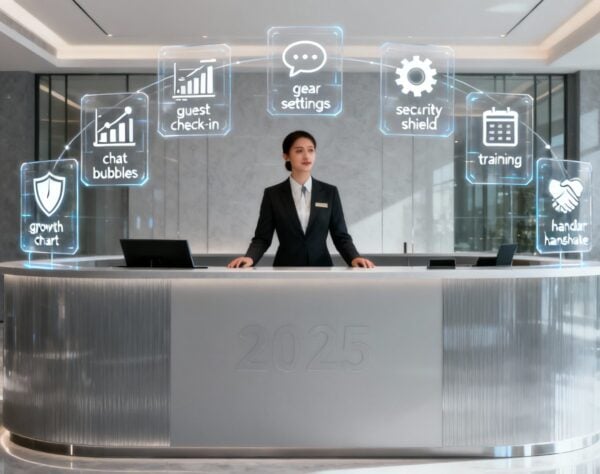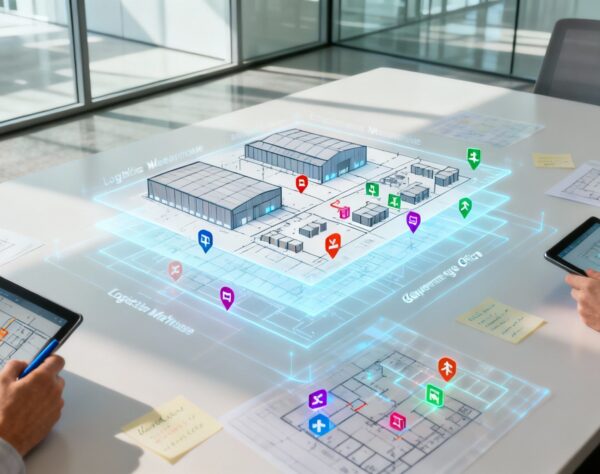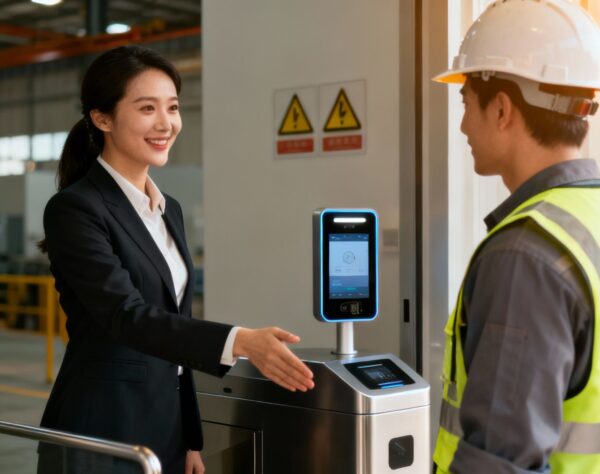
8 Essential Skills of Front Desk Receptionist for 2025
In today's fast-paced business world, the front desk is more than just a welcome point; it's the strategic command center for first impressions. While the role has evolved, the core skills of front desk receptionist have become more critical than ever. However, relying solely on human skill can lead to inconsistencies that damage your brand's image. In fact, 76% of consumers report that a single bad customer service experience can ruin their entire perception of a company.
This article breaks down the eight indispensable skills every modern receptionist needs. We will demonstrate how each one is amplified by smart technology that delivers tangible benefits.
You will learn how a visitor management system transforms the front desk from a cost center into a powerful asset for security, efficiency, and brand reputation. By automating routine tasks, these systems have been shown to reduce visitor check-in times by up to 80%, freeing staff to focus on high-value interactions.
1. Excellent Communication Skills
As the first point of contact, a receptionist's communication skills set the tone for the entire visitor experience. This core competency goes beyond just being polite; it involves clearly and professionally relaying information, actively listening to visitor needs, and adapting communication styles for diverse audiences. Poor communication can lead to visitor frustration and inefficiency, with studies showing it's a primary driver of customer churn.
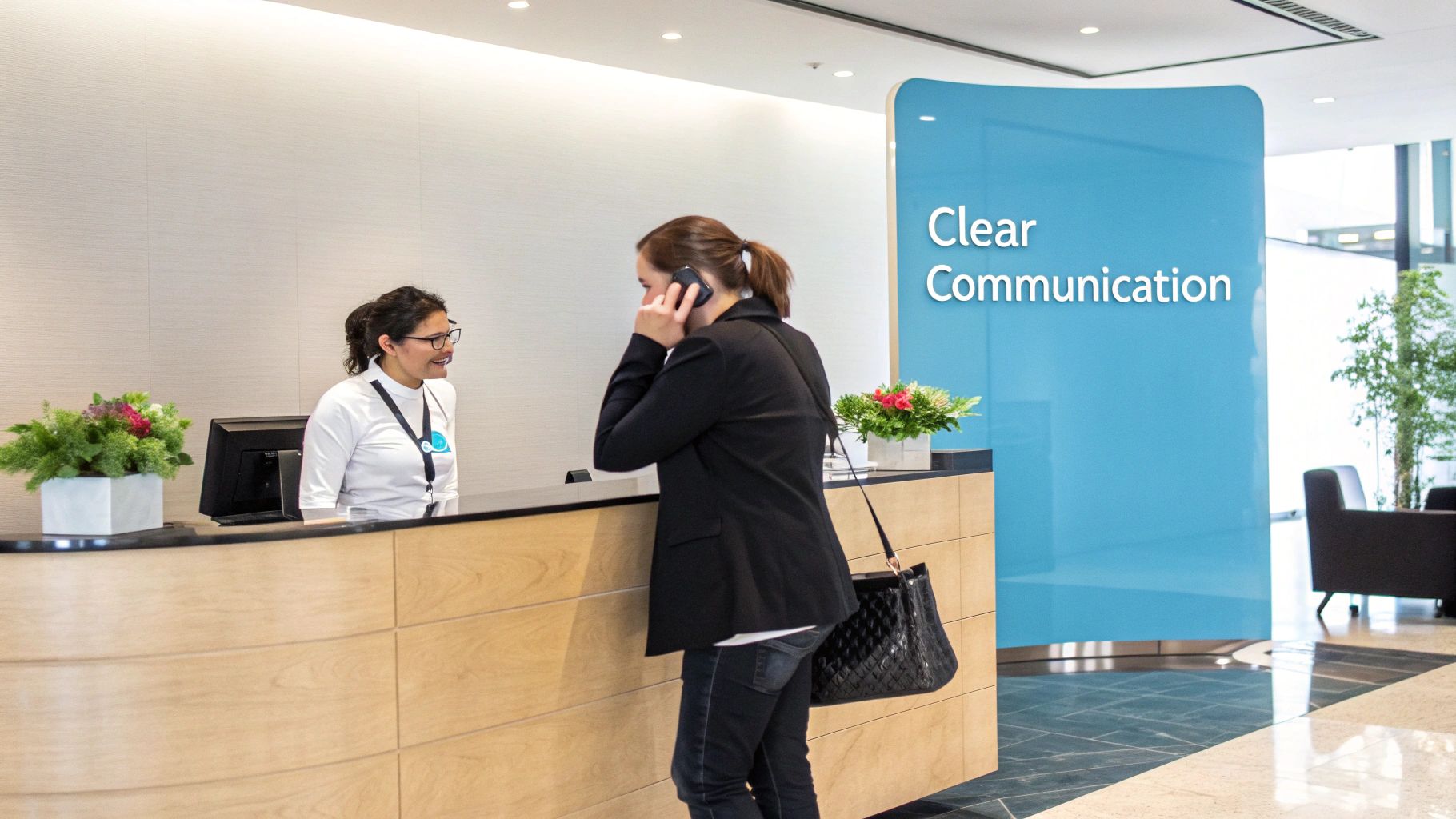
Effective communication is one of the most crucial skills of front desk receptionist because it directly influences a visitor's perception of your brand. Think of a medical receptionist patiently explaining a complex check-in procedure or a corporate receptionist seamlessly managing multilingual guests. These interactions build trust and project a professional, organized image that's vital for business success.
How to Implement Excellent Communication
To ensure every interaction is positive and productive, focus on these actionable strategies:
- Practice Active Listening: Repeat key information back to visitors to confirm understanding, such as "So, you have a 2:00 PM appointment with Jane Doe in Marketing. Is that correct?"
- Maintain Positive Body Language: Make eye contact, smile, and maintain an open posture to appear approachable and engaged. Nonverbal cues make up over 55% of communication.
- Use Positive Phrasing: Frame responses positively. Instead of saying "I don't know," try "Let me find that information for you."
- Leverage a Visitor Management System: Automating the check-in process provides a consistent, professional welcome, freeing your receptionist to focus on higher-value communication and personal assistance.
2. Customer Service Excellence
Beyond simple politeness, customer service excellence is about creating a consistently positive and supportive environment for every visitor. It means anticipating needs, resolving issues with grace, and ensuring each visitor feels valued. This skill directly impacts visitor loyalty and your organization's reputation, as research indicates that 86% of buyers are willing to pay more for a great customer experience.

Exceptional service is one of the most vital skills of front desk receptionist because it demonstrates genuine care and professionalism. Think of the hospitality industry, where staff at a Four Seasons hotel remember guest preferences, or the tech world, where Apple Store Geniuses patiently guide users through complex issues. To truly excel, a receptionist's customer service prowess can be further honed by understanding essential customer service skills common in high-pressure environments.
How to Implement Customer Service Excellence
To elevate every visitor interaction from standard to outstanding, focus on these practical approaches:
- Acknowledge and Empathize: Always start by acknowledging the visitor's concern. Phrases like, "I understand you need to see Mr. Smith urgently," show you are listening and empathetic.
- Use the L.A.S.T. Method: When faced with a complaint, Listen without interrupting, Apologize for the inconvenience, Solve the problem efficiently, and Thank the visitor for their patience.
- Develop a Solution Toolkit: Proactively compile a list of solutions for common problems, such as pre-printed maps for lost visitors or a contact list for frequently requested departments.
- Empower with Technology: A visitor management system streamlines the administrative burden of check-ins, allowing your receptionist to offer personalized service, like offering a beverage or confirming meeting details. For more ideas, explore our comprehensive guide on training for reception staff.
3. Technology Proficiency
In today's digitally driven world, technology proficiency is a critical competency, requiring a firm grasp of office equipment, phone systems, and various software platforms. From scheduling appointments to managing visitor data, the ability to navigate these tools efficiently is non-negotiable. Lacking these skills can create bottlenecks, frustrate visitors, and compromise security, directly impacting operational productivity.
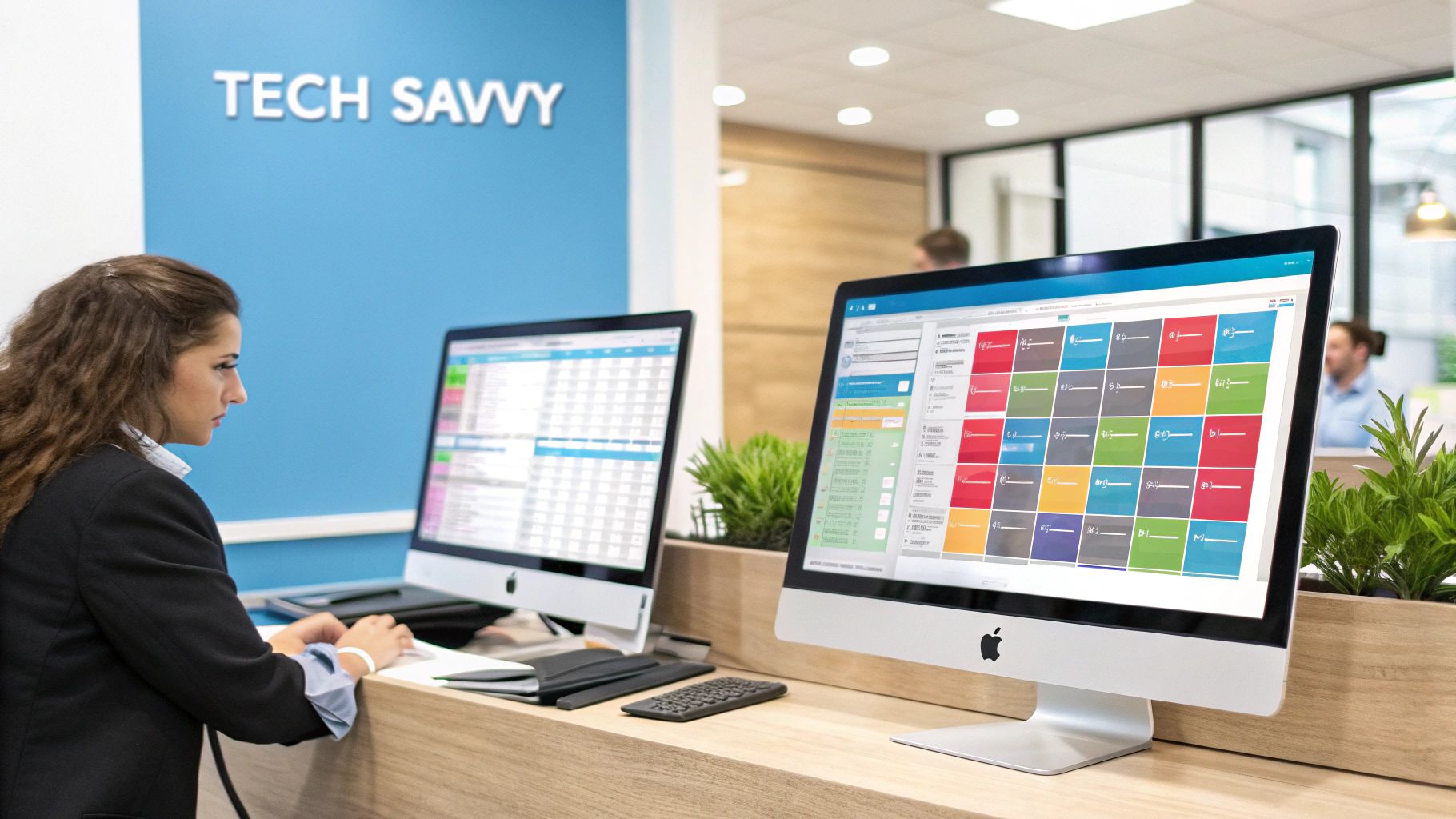
Mastery of relevant technology is one of the most essential skills of front desk receptionist because it directly supports a secure and seamless operation. A receptionist using a modern visitor system to pre-register guests and automate host notifications demonstrates a level of competence that builds trust. This proficiency also streamlines workflows, freeing up valuable time for more complex, human-centric tasks.
How to Implement Technology Proficiency
To ensure your front desk operates with modern efficiency, focus on building and maintaining these key technical skills:
- Master Core Software: Become an expert in essential tools like Microsoft Office Suite and Google Workspace.
- Utilize Keyboard Shortcuts: Practice common keyboard shortcuts for frequently used applications. This small habit significantly increases speed and efficiency.
- Create Quick Reference Guides: For complex procedures, keep a quick reference guide handy. This ensures consistency and accuracy, especially during busy periods.
- Embrace Visitor Management Systems: These systems provide a streamlined, user-friendly interface that simplifies visitor processing. This benefit enhances security and allows receptionists to focus on providing exceptional service rather than manual data entry.
4. Multitasking and Time Management
A front desk is a hub of constant activity, requiring the receptionist to juggle numerous tasks simultaneously without compromising service quality. From answering a ringing phone to greeting a new visitor, the ability to manage interruptions and prioritize responsibilities is essential. Inefficient multitasking can lead to errors, delays, and a chaotic front-of-house environment, with studies showing that it can reduce productivity by as much as 40%.
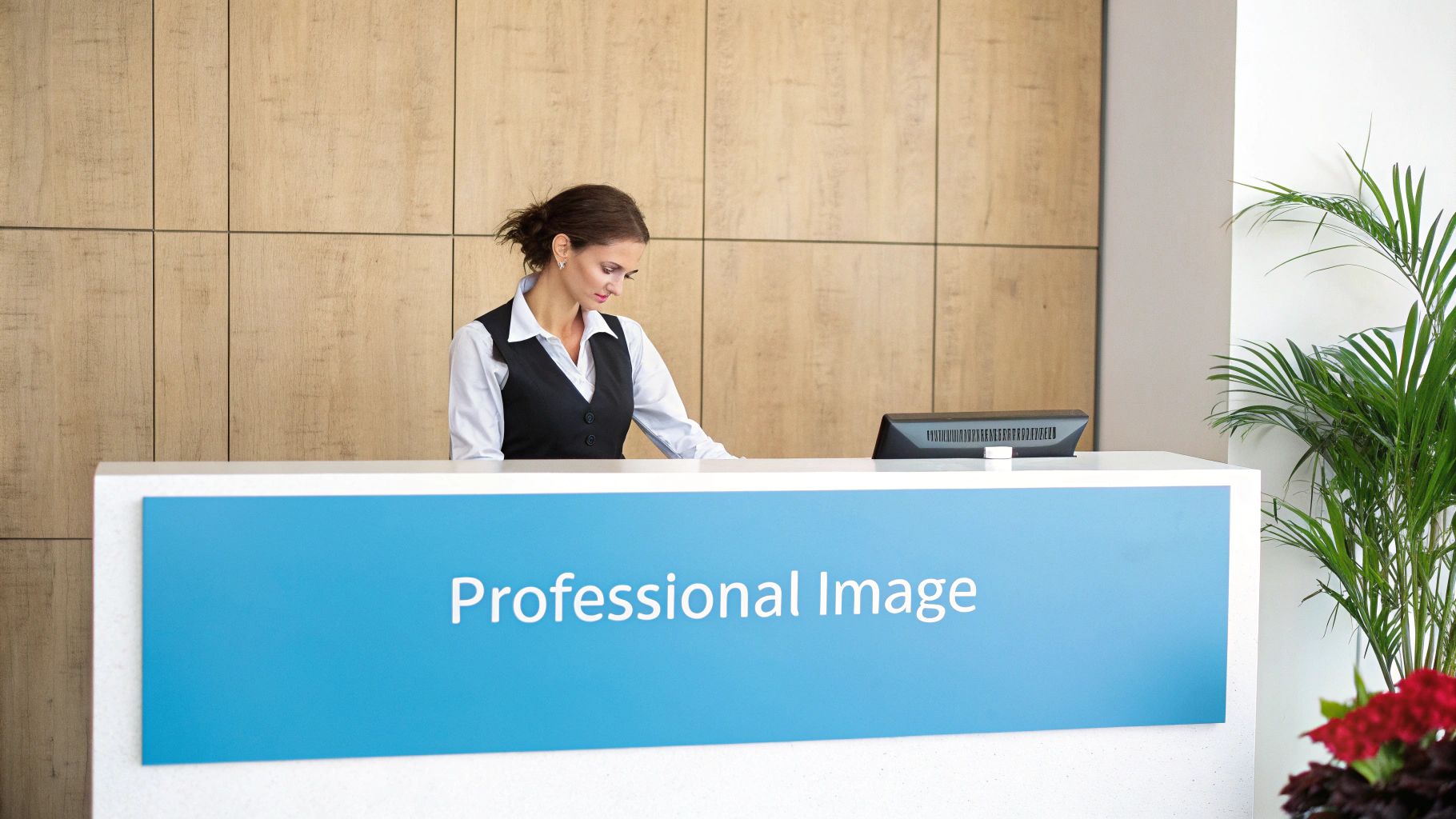
Effective multitasking is one of the most demanding skills of front desk receptionist because it directly impacts operational efficiency and visitor satisfaction. Consider a hospital receptionist managing patient check-ins while answering calls and processing insurance. Mastering this skill ensures that every task is handled professionally and promptly, creating a seamless and organized experience for everyone.
How to Implement Multitasking and Time Management
To manage a busy front desk without feeling overwhelmed, focus on these practical strategies:
- Prioritize with a System: Use a method like the Eisenhower Matrix to quickly distinguish between urgent and important tasks, focusing energy where it matters most.
- Use Checklists: Create simple checklists for routine procedures like opening or closing duties. This minimizes the risk of missing a step during busy periods.
- Manage Interruptions Gracefully: Learn to politely ask a caller to hold for a moment while you finish a face-to-face interaction, ensuring the person in front of you feels valued.
- Automate to Reduce the Load: A visitor management system removes the need to manually sign in guests, print badges, and notify hosts. This drastically cuts down on administrative tasks, enabling the receptionist to manage their time and attention far more effectively.
5. Professional Appearance and Etiquette
A receptionist’s appearance and etiquette are non-verbal cues that instantly communicate your company's values. Before a single word is spoken, visitors form an impression based on attire and demeanor. This skill involves adhering to company dress codes and understanding the social protocols appropriate for your specific industry, which is crucial as research confirms it takes only 7 seconds to form a first impression.
Maintaining a polished presence is one of the most visible skills of front desk receptionist because it directly builds credibility and trust. For instance, a luxury hotel receptionist with an impeccable uniform and refined manners reinforces the brand's promise of quality service. This visual consistency is a key part of creating a cohesive and welcoming reception area.
How to Implement Professional Appearance and Etiquette
To ensure your front desk consistently projects a professional image, focus on these practical guidelines:
- Adhere to the Dress Code: Understand and follow your organization's dress code. If one isn't formalized, observe management and aim for a similar level of professionalism.
- Practice Confident Body Language: Sit or stand with good posture, offer a firm handshake where appropriate, and avoid crossing your arms, which can seem defensive.
- Stay Culturally Aware: If you interact with international visitors, take time to learn basic greetings or customs to show respect and make them feel welcome.
- Keep Grooming Professional: Ensure your appearance is neat and tidy throughout the day. A well-groomed presentation shows attention to detail and respect for your role.
6. Organization and Administrative Skills
Behind every seamless front desk operation lies a foundation of strong organizational skills. This competency involves maintaining orderly systems, managing documentation, and ensuring all administrative tasks are handled with precision. From managing sensitive client files to tracking visitor logs, this skill prevents chaos and supports operational efficiency. A disorganized front desk can lead to lost information, missed appointments, and security vulnerabilities.
Superior organization is one of the most critical skills of front desk receptionist because it ensures accuracy and reliability in daily operations. A medical practice relies on meticulous record-keeping for patient safety, while a real estate office needs organized property listings to serve clients effectively. These administrative actions build a framework of trust and competence that is essential for business success.
How to Implement Strong Organizational Skills
To maintain an orderly and efficient front desk environment, focus on these practical strategies:
- Develop Naming Conventions: Establish and use a consistent system for naming digital files and physical documents to make them easy to locate.
- Use Checklists for Routine Tasks: Create checklists for daily opening and closing procedures, mail processing, or supply inventory to ensure no steps are missed.
- Create Color-Coding Systems: Implement a color-coding system for files, keys, or schedules for quick visual identification and sorting.
- Digitize Visitor Records: A visitor management system eliminates paper logbooks, creating a secure, searchable digital record of all visitor traffic. This benefit improves compliance and frees up valuable time for other essential administrative responsibilities.
7. Problem-Solving and Critical Thinking
A front desk is often the first line of defense against unexpected issues. The ability to quickly assess situations, identify problems, and implement effective solutions is a critical skill. Whether it's a double-booked meeting room or a last-minute cancellation, a receptionist with strong critical thinking skills can manage disruptions calmly and professionally, preventing minor issues from escalating and ensuring business continuity.
This ability is one of the most important skills of front desk receptionist because it directly protects your organization’s productivity and security. Imagine a hotel receptionist resolving an overbooking issue during a peak travel season or a medical receptionist navigating an insurance authorization problem. Their capacity to think on their feet maintains operational integrity and reinforces visitor trust.
How to Implement Problem-Solving and Critical Thinking
To empower receptionists to handle challenges effectively, provide them with a clear framework and resources:
- Adopt a Problem-Solving Framework: Teach a simple process like: Define the problem, Analyze the root cause, Generate potential solutions, and Implement the best one.
- Create a Resource Guide: Develop a quick-reference list of key contacts for different issues (e.g., IT for tech problems, facilities for maintenance, security for emergencies).
- Ask Clarifying Questions: Train receptionists to fully understand a situation before acting. Asking, "Can you tell me more about what happened?" prevents misunderstandings.
- Define Authority Levels: Clearly outline what decisions a receptionist can make independently and when an issue must be escalated to a supervisor. This empowers them while maintaining proper protocol.
8. Confidentiality and Security Awareness
A receptionist is often the gatekeeper of sensitive information, making confidentiality and security awareness non-negotiable skills. This involves a deep understanding of privacy regulations, managing access control, and demonstrating absolute trustworthiness. Failure to uphold these standards can lead to severe data breaches, with the average cost of a data breach now reaching millions, causing irreparable damage to your organization's reputation.
Confidentiality is one of the most critical skills of front desk receptionist because it underpins the trust clients place in your business. A medical receptionist upholding HIPAA or a legal assistant protecting attorney-client privilege performs essential functions that secure the organization's integrity. These practices are fundamental in today's data-sensitive world, where regulations like GDPR and SOX set high compliance standards.
How to Implement Confidentiality and Security Awareness
To fortify your front desk's security posture, integrate these key practices:
- Verify Identity Rigorously: Always confirm a person’s identity before granting access. A visitor management system strengthens this by creating an auditable trail and verifying credentials against pre-registered data.
- Secure Communications: Avoid discussing sensitive matters where they can be overheard. Use secure methods for transmitting documents, and keep confidential papers out of sight.
- Practice Digital Hygiene: Regularly update passwords and adhere to all IT security protocols. To further strengthen this, consider the importance of comprehensive IT security awareness training for UK businesses.
- Err on the Side of Caution: When in doubt about sharing information, always seek clarification from a supervisor or default to the most secure action.
Front Desk Receptionist Skills Comparison
| Skill/Ability | Implementation Complexity 🔄 | Resource Requirements ⚡ | Expected Outcomes 📊 | Ideal Use Cases 💡 | Key Advantages ⭐ |
|---|---|---|---|---|---|
| Excellent Communication Skills | Moderate – requires ongoing training | Moderate – training and coaching | Clear communication, fewer errors, better rapport | Customer-facing roles, multilingual settings | Builds trust, enhances customer experience |
| Customer Service Excellence | High – emotional labor and patience needed | High – supportive environment | High customer satisfaction, loyalty, fewer complaints | High-interaction, service-driven environments | Boosts reputation, reduces negative feedback |
| Technology Proficiency | Moderate to High – continual learning | Moderate – software tools/training | Increased efficiency, fewer errors, data insights | Offices using CRM, scheduling, payment processing | Improves productivity and information access |
| Multitasking and Time Management | High – mastering prioritization skills | Low to Moderate – task tools usage | Maximized productivity, reduced wait times | Busy reception desks, handling multiple concurrent tasks | Enhances efficiency and professionalism |
| Professional Appearance and Etiquette | Low to Moderate – ongoing upkeep | Moderate – attire and grooming | Positive first impressions, credibility | Formal and client-facing environments | Builds trust and reflects organization well |
| Organization and Administrative Skills | Moderate – establishing and maintaining systems | Moderate – organizational tools | Reduced errors, time savings, easy information retrieval | Documentation-heavy roles, record keeping | Supports office productivity and accuracy |
| Problem-Solving and Critical Thinking | Moderate to High – requires training | Low to Moderate – frameworks and resources | Quick issue resolution, less escalation | Roles requiring independent judgment under pressure | Improves operational efficiency and autonomy |
| Confidentiality and Security Awareness | Moderate – adherence to legal protocols | Moderate – training and monitoring | Compliance, trust, legal protection | Healthcare, legal, government, financial sectors | Protects sensitive data and ensures safety |
Empowering Your Front Desk for Maximum Impact
Mastering the eight core skills of a front desk receptionist forms the bedrock of an exceptional visitor experience. These abilities are strategic assets that shape first impressions, ensure operational security, and create a welcoming environment that reflects your organization's values. By cultivating these talents, you transform your front desk from a simple checkpoint into the command center of your brand's reputation.
However, human talent reaches its full potential only when paired with intelligent tools. A modern visitor management system (VMS) is the ultimate force multiplier for your front desk team. Statistics show that businesses using a VMS report a significant 30% reduction in visitor wait times and a 25% boost in overall operational efficiency. By automating routine tasks like sign-ins and badge printing, you empower your receptionist to focus on what truly matters: high-value human interaction and proactive problem-solving.
Investing in these skills of a front desk receptionist is crucial, but investing in the technology that supports them is what unlocks true excellence. This dual approach ensures your front-of-house is not just efficient but also remarkably effective. It creates a secure, compliant, and seamlessly professional environment that leaves a lasting positive impact on every visitor, client, and contractor who walks through your doors.
Ready to empower your team and streamline your front desk operations? Discover how VisitUs can automate routine tasks and free up your staff to deliver an unparalleled visitor experience. Explore the benefits at VisitUs today.


